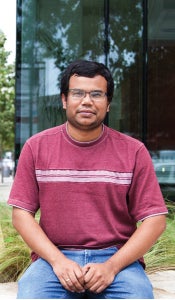This post is a part of our weekly International Voices column, writing by UT students, for UT students. Enjoy!
Have you ever been in a situation where your heart is pounding and you have a ton on your mind? That is part of the unfortunate day in a student’s life, called exam days. The other day I was thinking about the many hours I have spent in my life sitting in a desk taking a test. I don’t remember the exact number, but a lot of hours were spent demonstrating my ability in mastering the subject materials. Among all that numerous tests, and all the long sleepless nights it all came down to two tests: The GRE and PhD qualifying exam.

Reporting the GRE score is a general requirement for PhD admissions to most, if not all universities. GRE exam tests for two major skills: verbal and numerical skills. I believe many of you would agree that for the international students, verbal is the most difficult hurdle to jump over. The first step in GRE exam preparation is the conglomeration of an exhaustive list of academic words that are less commonly used in general discussions. These words are very complex and hard to fully understand. In addition to mastering a long list of vocabulary, I found it useful to read articles from diverse sources. After a short preparation of 8 weeks, I decided to take the step forward and face GRE. It was early November, 2009. The GRE seemed a lengthy exam to me and it was very challenging to stay focused for the entire duration of the exam and score well. Getting a good score is very important as the score plays an important role in the evaluation process of an international students’ application material to U.S. universities.
After joining the PhD program, it felt to me that I went through all the troubles of getting through the GRE only to see the main event: the PhD qualifying exam. The PhD qualifying exam is the exam to demonstrate your core knowledge in the subject area you want to pursue your PhD in. Looking at the bright side, you don’t have to score an A in this exam, there are only two grades: Pass or Fail. Every university, even individual program within the same university has a unique format for this examination. To aid the prospective PhD students, I would write about the format we follow at UT EWRE. In our program, the exam is 180 minutes. You are handed total four questions from four professors on their chosen subject area. It is a closed book exam and you have 90 minutes to prepare your answers. After the 90 minutes, the professors enter the room and you have to give a presentation of your work to the professors, defending your answers in case they raise further concern. This style of examination ensures two things: first, the student understands the topic and that his/her answers are on the basis of scientific/engineering principles, not just solving the problems and crunching numbers; and second, the student is quick witted enough and can think on his/her feet. The hardest part of the exam in my opinion was to dodge the rebound questions from the professors in response to my answers.
Studying for any exam requires hard work, but in my mind these two exams stand out. Work and effort necessary to do well may drive you mad. And after you get into the program, you need perseverance as well. PhD’s require extra years, more work, and less sleep. But, those extra years could help you remodel yourself, and change you for the better. Your PhD research could make you feel that you’ve contributed something to the human knowledge. I strongly believe, you don’t just take a degree at the end of your hard work on your PhD: you take the experience, knowledge, and training in the process. If that’s something you are interested in, I assure you every exam, including the two I mentioned above, would be a very good learning experience for you.
